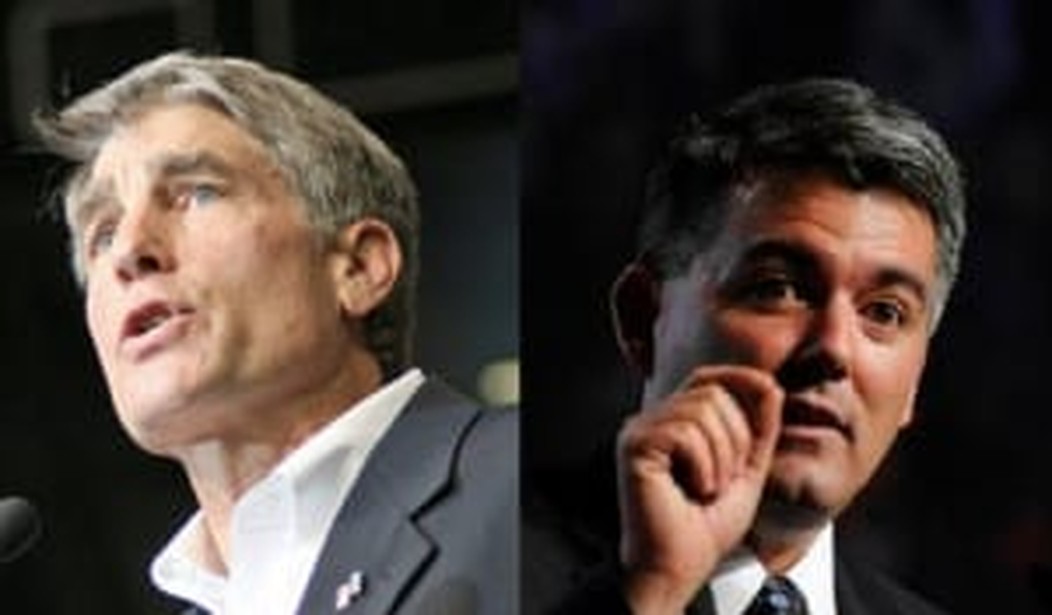In Colorado’s last six statewide elections, voters have chosen the Democratic candidate, including the last two presidential elections.
Now Republicans across the nation view Colorado as one of perhaps six locations that could tip the balance of power in the U.S. Senate, and Democrats in this purple state are becoming increasingly uncomfortable.
The race under the microscope is incumbent Sen. Mark Udall (D-Colo.) vs. Rep. Corey Gardner (R-Colo.), and Udall’s camp acknowledges the most recent polls show Gardner with a one- or even two-percentage point lead. It stands as a disconcerting turn of events for all those Democrats in Colorado and across the nation who have such a vested interested in this race.
Only four months ago, the election was set up as a likely slam-dunk for Udall, who expected to face a far less challenging (and baggage-ridden) Ken Buck, the Weld County district attorney who unsuccessfully challenged Sen. Michael Bennet (D-Colo.) in 2010.
Surprisingly and with scant explanation, Gardner opted to abandon his own slam-dunk re-election efforts for his seat in the House, announcing that he would instead begin campaigning against Udall. Fellow Republican Buck stepped aside, and now stands a good chance of inheriting Gardner’s seat in Congress.
Essentially, the Republicans had chosen their most electable candidate to go against Udall in this most critical of races.
So far, it seems to be paying off, no matter how hard the Udall camp tries to paint Gardner as a pro-personhood, anti-immigration, environment-be-damned candidate – issues that seem to poll in Udall’s favor in most of Colorado, and certainly in his home town of Boulder. (Gardner wants everyone to remember, via his television commercials, that he grew up in rural Yuma and lives in the same house that his great-grandparents owned.)
The latter issue of oil-and-gas exploration/production/delivery has occupied some of the candidates’ focus (most specifically in the form of the Keystone Pipeline, which Gardner wants and Udall doesn’t), and Gardner’s camp described Udall as hypocritical in his rejection of Keystone at the same time that he supports exports on liquid natural gas.
But the real back-and-forth has come in the form of personhood and immigration press releases. For example, from a press release dated June 20, Udall describes Gardner’s “disturbing record on women’s access to healthcare.” And on June 26, Udall shifted gears with a release announcing that Gardner had voted “to allow immigrants to be blackmailed and threatened with deportation.”
One of the “personhood” issues that the Udall camp has clung to most tenaciously is the one that makes Gardner seem indecisive. Gardner acknowledged that he changed his mind on personhood when he realized that it would outlaw certain types of contraception – a result that he could not support. After the recent Supreme Court ruling that favored Hobby Lobby and other businesses wanting say over contraceptive coverage for employees, Gardner commented that it was imperative “to move quickly to make oral contraceptives available to adults without a prescription.” He sought to turn the apparent personhood flip-flop into an advantage, noting that it proves he is in touch with his constituents – and understands the math of the 3-1 public opposition to his previous stance.
In a TV ad, Gardner explains, “They’re attacking me for changing my mind on personhood after I learned more and listened to more of you. No wonder Sen. Udall and President Obama can’t relate to that.”
Throughout the early months of the campaign, Gardner took frequent opportunities to link Udall and Obama, especially when the topic turned to healthcare, repeating the statistic that Udall has voted 99 percent of the time in alliance with Obama.
In other claims, the Udall camp says Gardner is “too radical” in his approach toward education funding (“more radical than Michele Bachmann!”) and that Gardner has long discriminated against the LGBT community. The rhetoric adds up to the tag line that Gardner is “too extreme for Colorado.”
Perhaps in the hope of sorting all this out, the candidates have agreed in a series of dueling press releases to participate in some public debates. Although, considering that the candidates are debating the debates – essentially trying to take credit for the whole idea of such an event – it could be a long time before any of this campaign rhetoric gets cleared up.









Join the conversation as a VIP Member